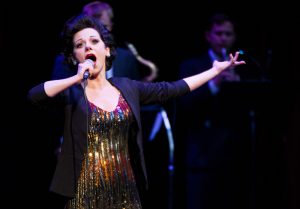BACK FROM OVER THE RAINBOW
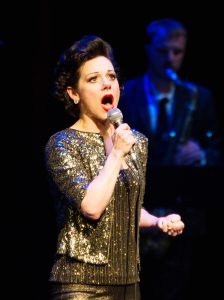 Please don’t take my word for it. See, hear and cherish for yourselves Angela Ingersoll’s wonderful reclamation of the great Judy Garland — the look, voice, persona, mannerisms, charisma and legend.
Please don’t take my word for it. See, hear and cherish for yourselves Angela Ingersoll’s wonderful reclamation of the great Judy Garland — the look, voice, persona, mannerisms, charisma and legend.
It’s remarkable enough how much this Emmy-nominated songstress resembles the girl from Oz — her winsome warble, brushing-back gestures, nervous giggle, impassioned belting, and shy but infectious smile. But to sound so much like her — and you certainly do not have to close your eyes to be taken back — you imagine the pop diva singing right to and for you.
Talk about “You Made Me Love You.” She did.
For over two generous hours, this labor of love — which goes beyond impersonation to virtual channeling — renders a constant payoff in Judy Garland: Come Rain or Come Shine, Ingersoll’s latest embodiment of La Garland.
America’s consolation prize for surviving the Great Depression, Judy, of course, was an MGM child star forever enshrined in America’s first fairy tale. Sadly, for her there really was no place like home. Though personifying innocence itself at 16, Judy never knew a normal childhood. The Andy Hardy movies with Mickey Rooney were not enough. Her death in 1969 at 46 of drugs ended a 30-year showbiz miracle.
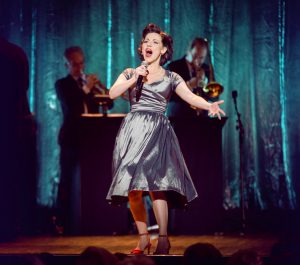 Produced by Music Theater Works at Evanston’s Nichols Concert Hall, this tribute concert not only recreates the once and future Judy at least as large as life (4’11”). Ingersoll also presents her very parallel perspective on how a star is reborn.
Produced by Music Theater Works at Evanston’s Nichols Concert Hall, this tribute concert not only recreates the once and future Judy at least as large as life (4’11”). Ingersoll also presents her very parallel perspective on how a star is reborn.
Regaling us with the inside-out connections that she feels with the woman she becomes — a short stature, a supportive husband, a gay uncle, a passion to sing her way out of solitude (“Make Someone Happy”) — Ingersoll brings us into Judy’s roller-coaster career. We hear of her abrupt departure from her home studio at 28, her five not so fabulous husbands, her bout with ”the Oscar that got away,” and her swelling up to double her weight to 200 pounds (from cirrhosis of the liver, not hepatitis, as Judy said).
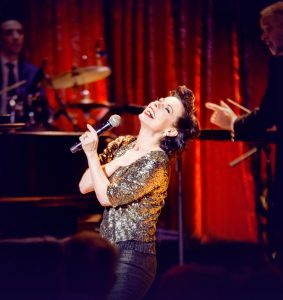 Dolled up in silk party dress and later, Judy’s signature pants suit, Ingersoll particularly celebrates the, for her, most accessible part of Garland’s glory — her 18-year TV and concert career at venues like London’s Palladium and, most famously, Carnegie Hall on April 23, 1961. Throughout these “seasons of love” the former gawky and insecure Frances Ethel Gumm was both finally totally in control and, of course, often not at all.
Dolled up in silk party dress and later, Judy’s signature pants suit, Ingersoll particularly celebrates the, for her, most accessible part of Garland’s glory — her 18-year TV and concert career at venues like London’s Palladium and, most famously, Carnegie Hall on April 23, 1961. Throughout these “seasons of love” the former gawky and insecure Frances Ethel Gumm was both finally totally in control and, of course, often not at all.
We learn how this “dream girl next door” helped to bring Gene Kelly to Hollywood fame and how her soulmate John F. Kennedy gave her a ton of encouragement and protection. (Her “Battle Hymn of the Republic” was a final salute to a martyred President.) Ingersoll also relates her special relationship with Judy’s only son, Joe Luft, who in a way got his mother back again whenever she performed “Happiness Is Just a Thing Called Joe.”
And then there are the songs, vaudeville and other gold standards, backed up by a superb six-man orchestra and rendered as if we’re present at the creation. Just to list them (which the program does not) is to return a star to her firmament: “Smile,” “Get Happy,” “I Got Rhythm,” “Singin’ in the Rain,” “The Trolley Song,” “For Me and My Gal,” “But Not for Me,” “Zing Went the Strings of My Heart,” “After You’ve Gone,” “Stormy Weather,” “The Man That Got Away,” a glorious “Chicago,” “Rock-a-Bye Your Baby with a Dixie Melody” (Al Jolson was her favorite singer), and a pizzazz-packed “Swanee” to end the fun on a high note.
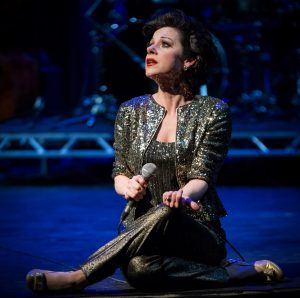 Most moving perhaps is Ingersoll’s tender version of a lesser known Garland gift: Virtually an artistic credo, Noël Coward’s most personal song declares that “All I’ve had is a talent to amuse” — which makes the wish “If Love Were All” all the sadder and deeper. Of course — inevitably and enthrallingly — Ingersoll delivers the full version of “Over the Rainbow,” intro and all. Sung with her simply sitting on the stage, it ultimately takes us just there.
Most moving perhaps is Ingersoll’s tender version of a lesser known Garland gift: Virtually an artistic credo, Noël Coward’s most personal song declares that “All I’ve had is a talent to amuse” — which makes the wish “If Love Were All” all the sadder and deeper. Of course — inevitably and enthrallingly — Ingersoll delivers the full version of “Over the Rainbow,” intro and all. Sung with her simply sitting on the stage, it ultimately takes us just there.
In the second act, Ingersoll asks the primarily older audience to share any recollections they have of seeing Judy and what she meant to them. Several did, with surprising ardor, a tribute to how much this performer had managed to stir up and reconsecrate.
photos by Amy Boyle Photography
Judy Garland: Come Rain or Come Shine
Music Theater Works
Nichols Concert Hall | 1490 Chicago Ave. in Evanston
ends on October 14, 2018
for tickets, call 847.920.5360 or visit Music Theater Works
for more shows, visit Theatre in Chicago

